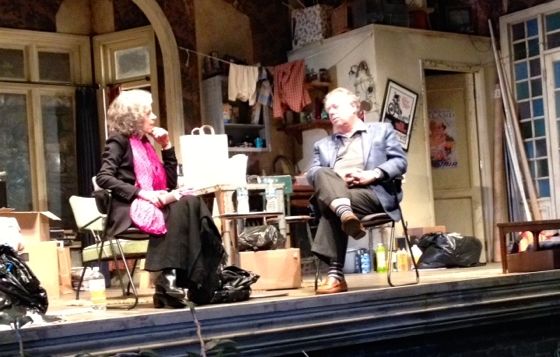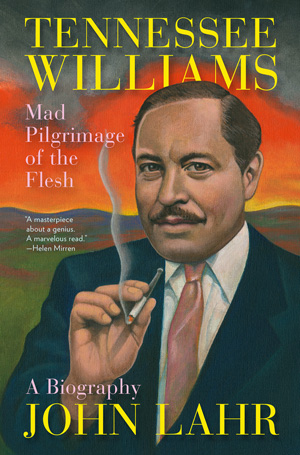| « To-Do This Month: Chicago Humanities Festival 2014 | Sex, Drugs & Nonfiction: Chuck Klosterman Reads at Columbia College » |
Author Thu Oct 16 2014
John Lahr and His "Mad Pilgrimage:" Writing the Biography of Tennessee Williams

John Lahr, veteran writer and biographer, sat on the Steppenwolf Theatre stage Monday night to discuss his definitive and intimate biography of Tennessee Williams, one of America's greatest playwrights.
His book, Tennessee Williams: Mad Pilgrimage of the Flesh (Norton 2014) is one of the five nominees for the nonfiction National Book Award.
Lahr and Martha Lavey, Steppenwolf artistic director, were seated on a stage dressed for the cluttered Irish bachelor-hoarder's apartment for the current Steppenwolf production, Conor McPherson's The Night Alive. Lavey, whose departure as artistic director was recently announced, was prepared with her own advance copy of the book stuffed with fuchsia post-it notes. She asked short, pointed questions and let Lahr warm to his subject.
Williams, born Thomas Lanier Williams in 1911, adopted the name Tennessee early in his writing career. He wrote some 70 plays including masterpieces such as The Glass Menagerie, Streetcar Named Desire, Cat on a Hot Tin Roof, The Night of the Iguana, The Rose Tattoo and Summer and Smoke.
 Lahr, theater critic and writer for The New Yorker for 21 years, talked about how he came to write the Williams biography when there are already many Williams biographies in print. In brief, he inherited the responsibility from Lyle Leverich, who published the first volume of a Williams biography before his death. Lahr received "seven FedEx boxes and 70 untranscribed tapes" of material. He decided to start at the beginning of Williams' life, rather than writing the second volume of the Leverich version. The result is a deeply researched, vividly written story of the life, both private and public, of one of our greatest writers. The subtitle -- "Mad Pilgrimage of the Flesh" -- is a quote from Williams' own writing.
Lahr, theater critic and writer for The New Yorker for 21 years, talked about how he came to write the Williams biography when there are already many Williams biographies in print. In brief, he inherited the responsibility from Lyle Leverich, who published the first volume of a Williams biography before his death. Lahr received "seven FedEx boxes and 70 untranscribed tapes" of material. He decided to start at the beginning of Williams' life, rather than writing the second volume of the Leverich version. The result is a deeply researched, vividly written story of the life, both private and public, of one of our greatest writers. The subtitle -- "Mad Pilgrimage of the Flesh" -- is a quote from Williams' own writing.
Lavey asked Lahr to talk about Williams' early family life with its repressed sexual character. Williams said his mother, Edwina, considered the model for Amanda Wingfield in The Glass Menagerie, was a "monolithic Puritan." Sex was a banned subject in the Williams household, just as Williams' father Cornelius Coffin or CC, had been banished from the marriage bed from 1918 on. Before that, when Edwina allowed her husband marital privileges, her screams were so loud that the children were terrified. "We'd run out in the streets and the neighbors would take us in," Williams remembered.
Neither parent was physically affectionate and Williams and his two siblings were thus deprived of affection and sexually immature until adulthood. "The horrible family atmosphere was also a recipe for madness," Lahr writes. Williams' older sister Rose was hospitalized for nervous and emotional problems and a lobotomy was performed on her when she was 28. Williams' younger brother Dakin was "sexually inexperienced" until his marriage at age 37.
Williams was a virgin until 26, then had many male liaisons and affairs and a few long-term relationships. Lahr's book tells the stories of these alliances from Williams' letters and journals and makes clear that once the writer got over his sexual repression, he made up for lost time.
Lahr also talked about his psychological insights into Williams' nature as an "hysteric," or one who suffered from a complex emotional neurosis. Williams once said "Blanche is me," referring to the emotionally distraught sister in Streetcar Named Desire. Most interestingly, Williams used his own neurosis to write plays that "were a picture of my own heart." Lahr quotes him as saying his plan was to be "simple and direct and horrible ... I will speak truth as I see it ... without concealment or evasion and with a fearless unashamed frontal assault upon life."
Williams' first major play, The Glass Menagerie, reflects this projection of family members' lives upon the stage. The characters Amanda and Laura are based upon his mother and sister, and the narrator, Tom, is a poet who aches to escape from the suffocating home.
The biography provides many fascinating details on Williams' work with various directors, including Elia Kazan, and stories of how choices are made for actors in leading roles, such as Stanley in Streetcar Named Desire or Maggie in Cat on a Hot Tin Roof.
Williams' career received a jump start in Chicago when The Glass Menagerie opened here in December 1944. The Chicago Tribune's tough critic, Claudia Cassidy, gave it a glowing review after seeing it several nights in a row. The play went on to great success in New York, but the Cassidy review was considered a turning point for the play and for the career of its young playwright.
Lahr also wrote Prick Up Your Ears, a biography of English playwright Joe Orton, and co-wrote the Tony-award-winning script for Elaine Stritch at Liberty. The son of comic Bert Lahr, he also wrote a biography of his father, Notes on a Cowardly Lion. His latest work is a profile of actor Al Pacino in the Sept. 15 issue of The New Yorker.









